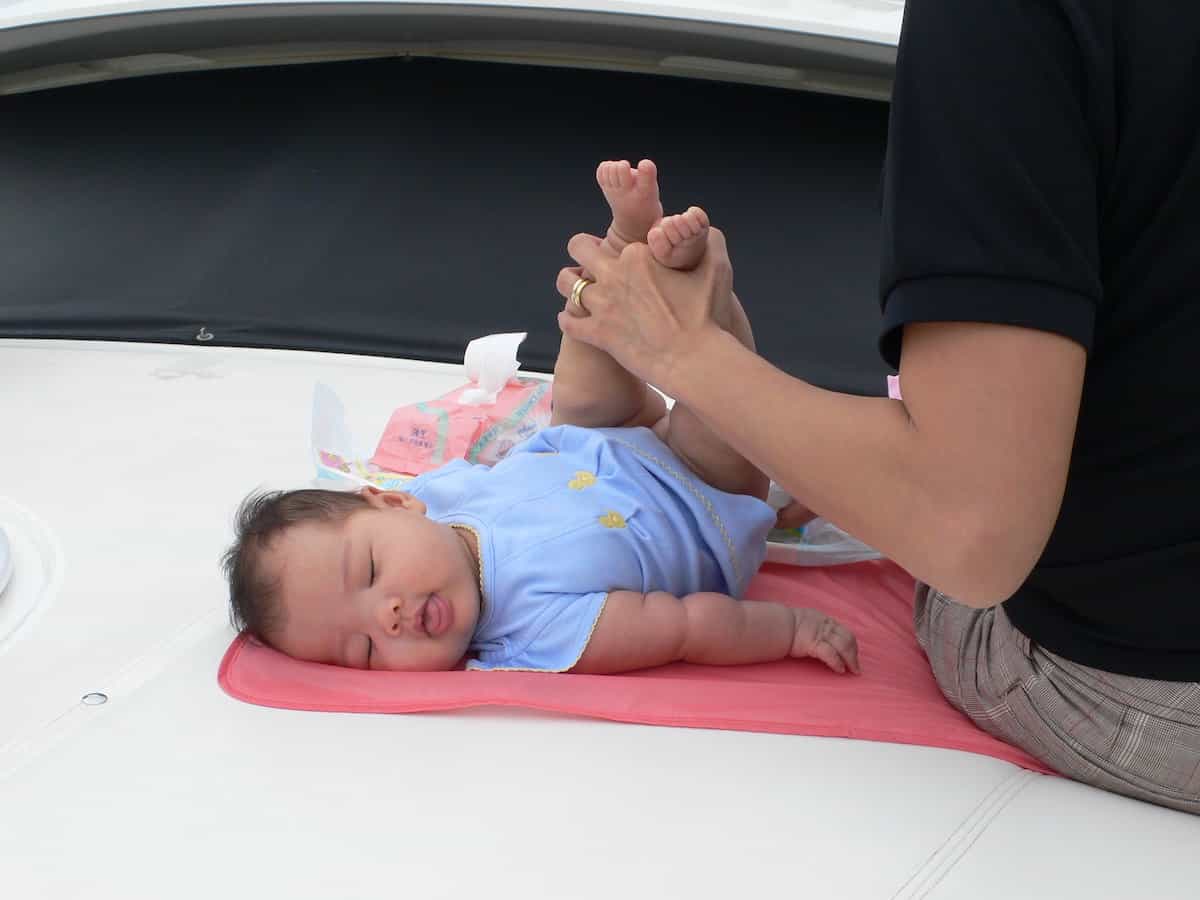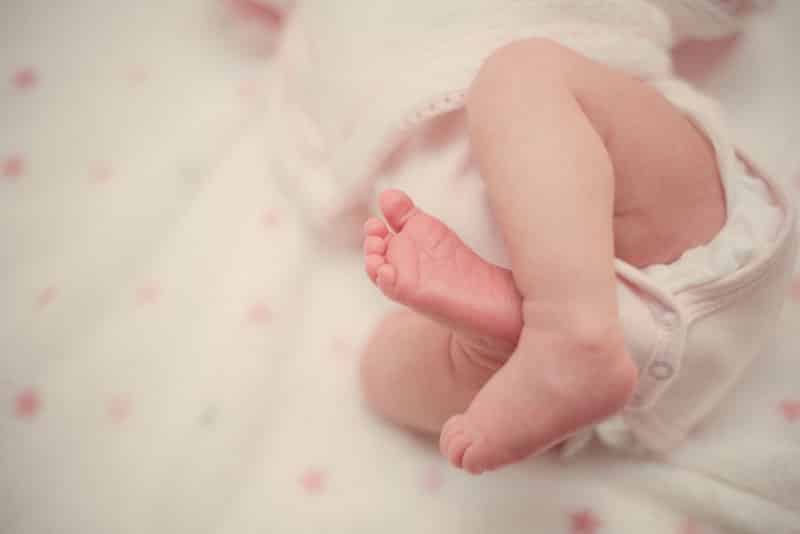
Last Updated on August 26, 2021
There’s nothing in the world like being a parent. You have this amazing little human that is completely dependent upon you. You have a tiny bundle of true, unconditional love that you can hold in your arms.
However, you also get all the not-so-fun parts of being a parent, including the baby waking up several times a night. Sometimes it’s because he or she is hungry.
Sometimes, especially with toddlers, it’s because they’ve had a nightmare. Sometimes, it’s because the baby has formed sleep associations and wakes out of habit. Sometimes it’s a leaky diaper that has caused this nighttime chaos.
Contents
So if you are experiencing overnight diaper leaks in infants and toddlers, don’t despair.
We are about to take you through some of the best ways to prevent this chaos from being added to your morning (or middle of the night) routine. You won’t have to worry about washing a load of crib sheets before heading off to work nearly as often.
Make sure that you take the time to change baby’s diaper before putting them to bed. A fresh, dry diaper will help baby be more comfortable and they’ll be able to sleep better. Plus, a dry diaper can absorb more when baby does go to the bathroom at night.
Sure, they might be a bit more expensive because of the extra absorbency they offer. However as you’re only using them at night, they should last you for some time. Overnight diapers have extra absorbent layers that promise to keep baby fresh and dry for 12 hours or more.
Nighttime diaper leaks happen when baby is going to the bathroom so much that the diaper can’t keep up. If you find that baby seems to be fine during the day but is leaking through their diaper at night, consider moving up one size.
As a new parent, you might have to swap brands a few times until you find one that is right for you. However, sometimes, something might have been working for a while and then suddenly it’s not. This means that it’s time to experiment again and try something different. After all, every brand has different absorbances.
The fact is that cloth diapers offer much more absorbency than disposable ones. So, you might want to switch to using cloth diapers overnight if the leaking has continued for any length of time.
When baby is constantly leaking through their diaper, it’s because they’re using the bathroom so much that the diaper just can’t absorb it all. Pay attention to whether it’s the front or the back that seems to be leaking so much. Then, you can use a diaper liner in that spot to prevent diaper leaks.
A creative way to prevent overnight diaper leaks is to add a pad to your baby’s diaper at night. This way, if he or she does leak through the pad, the diaper layer is still in the way and it will not make it out to your baby’s dry pj’s or crib sheets.
Peejamas are jammies that are designed with an absorbent cloth diaper layer built in specifically to prevent overnight diaper leaks. These were actually designed with toddlers in mind, to help with overnight potty training, but they work pretty well with younger babies too.
When used in conjunction with an overnight diaper, you can be sure that you will wake up to dry sheets and won’t be scrambling in the middle of the night to change the sheets or get them washed before heading off to work.
This is a common mistake that parents of boys tend to forget about. If you have a baby boy that is leaking through his diaper at night, be sure to point the boy parts down so if he does go to the bathroom at night, he’s going into the most absorbent part of the diaper.
When you put baby’s overnight diaper on, make some adjustments to the way you put it on. Try pulling the diaper forward a bit so that it sits higher on baby’s stomach. This brings more of the absorbency to the front.
You might also want to angle the straps up slightly, which puts more pressure on the areas to hold some of that liquid in. Finally, make sure that the fabric around baby’s legs is fluffed out and there’s nothing bunched up.
If overnight diaper leaks are an issue, take a minute to change baby’s diaper when he or she wakes up in the night for any reason. This will not only do a lot to help you prevent those overnight diaper leaks, it will make it much easier for baby to fall back asleep since a dry diaper is much more comfortable than a wet one.
Belly sleepers are much more likely to have overnight diaper leaks than those that sleep on their backs. The extra pressure at the front of the diaper seems to cause more issues. As much as possible, try to get baby to sleep on his or her back. Plus, this is typically what doctors recommend anyway as the safest sleep habits.
This is definitely a last-ditch effort and should really only be used for toddlers, and even then only sparingly. If your baby is hungry or wants water, you should give it to them.
A thirsty or hungry baby is just going to be miserable and could ultimately result in dehydration, which is definitely not something you want to deal with.
However, there are certain drinks that can (and should) be limited, such as sugary drinks or juices. Infants should not be drinking these drinks anyway.

The very first step in preventing something is learning what the root cause of it is in the first place. Therefore, let’s take a look at some of the most common reasons that babies and toddlers leak through their diapers at night. There are four main reasons.
ADH, or antidiuretic hormone, is the hormone in your body that tells it when urine production should be decreased. In adults, this hormone increases overnight so you’re not up and down all night going to the bathroom. However, in babies, this isn’t the case.
In babies and toddlers, the ADH levels are lower, which means urine production continues to be high all night. Therefore, when you combine a full bladder with high ADH levels, you could end up with a baby that leaks through their diaper overnight.
Babies and toddlers hit several growth spurts, so it’s common that they end up between diaper sizes from time to time. The smaller diaper is definitely too small, but the bigger size is just slightly too big. This is definitely an equation for a leaky diaper during the night.
When the baby is an active sleeper, the diaper is going to be rearranging/shifting around all night. Therefore, since there will be spots where the diaper isn’t quite as snug as it needs to be, the urine can get free- which means leaky diapers while they sleep.
Babies that sleep on their tummies are much more likely to have leaky diapers in their sleep. This is because sleeping on their stomach puts pressure on the diaper in different spots, increasing the chances of baby’s urine getting out.
Keep in mind that it may take some time to work through these thirteen tips for preventing overnight diaper leaks and figure out what works best for you. Therefore, consider trying the following to make it less of a hassle when baby does leak through his or her diaper.
Placing a mattress pad or blanket on the mattress between the baby and the crib sheet will make it much easier when baby does leak through the diaper. This way, the blanket or pad will catch the urine and you’ll just have to change baby’s pajamas and place a new mattress pad or blanket down before laying baby back down.
A word of caution, if your baby is younger than 1 year old, he or she should not be sleeping with anything in the crib with them. Therefore, if you do use this option, make sure that it fits tightly on the mattress or place it under the main sheet so baby can’t smother themselves with it.
If you have a second crib mattress, consider doubling up to save time on changing when baby leaks through their diaper overnight. It should go like this: mattress/sheet/mattress/sheet. Then, baby goes on top of the top mattress.
This way, if baby does leak through, you can change baby, move the extra mattress and there your clean layer awaits baby to go back to sleep.
This should only be done if you’re sure your baby won’t get too cold at night. This way, it saves you time during those overnight diaper changes. Plus, it helps you avoid the hassle of extra laundry when baby does leak through their diaper.
You can also leave the sheets off the mattress and simply wipe it down if you change baby in the middle of the night, or when it’s time to get up if they have wet the bed.
Most parents do stay up a little later than baby. So, when you go to bed, consider doing a quick diaper change. This way, if baby is already wet, you give him or her a dry diaper and chances of them leaking through are decreased.
Of course, not everyone can do this. In some cases, it will wake baby up and it can be hard to get him or her back to sleep. On the other hand, some babies will sleep right through it.
If a baby is constantly having overnight diaper leaks, the mattress can get pretty gross pretty fast. Therefore, you might want to consider getting a washable mattress. That’s right, there are machine-washable mattresses on the market.
Sure, wiping one down with an antibacterial wipe can help, but that only goes so far. Washable mattresses are definitely the way to go if this is a chronic problem.
Being a parent can be the most amazing experience in the world. You have this little bundle of joy that is so absolutely perfect.
On the other hand, if baby tends to have overnight diaper leaks all the time, being a parent can become pretty frustrating pretty quickly.
However, it’s truly only a phase and they’ll grow out of it soon enough. But for now, consider trying some of these tips while you wait for that to happen.
Related Articles-
Join our newsletter for the latest updates!